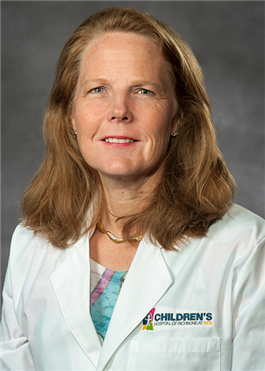
Ann M Ritter, MD
Professor
Neurosurgery, Center for Craniofacial Care, Spasticity Clinic, Spina Bifida Clinic
Pediatric Neurosurgery, Neurosurgery
Locations
Areas of interest
Brain and spinal tumors
Chiari Malformations
Minimally invasive craniosynostosis treatment
Hydrocephalus
Premature brain injury
Spina Bifida clinic
Tethered cord
Dorsal rhizotomy for improvement of spasticity
Bio
‘We treat your child like they are our own’
As a pediatric neurosurgeon, Dr. Ann Ritter is trusted to care for the most precious part of a child: their brain. Since the 1990s, Dr. Ritter has cared for children who need surgery on their brain and spinal cord, along with the skull and bones in those areas. She has a special expertise in treating children living with craniosynostosis, brain and spinal tumors, Chiari malformations, hydrocephalus, premature brain injuries, spina bifida, tethered cord (spinal cord malformations), and head-shape disorders.
Recognized by patients and families for her friendly and attentive bedside manner, Dr. Ritter makes it her priority to listen to both children and their parents and to consider their concerns when coming up with treatment options. “The only thing that matters in my career is that your child is doing well,” says Dr. Ritter, an associate professor at the VCU School of Medicine’s Department of Neurosurgery. “There is no better part of this job than when I see kids smiling and parents are happy in what can often be challenging circumstances. And hugs certainly don’t hurt, too.”
Board-certified in both adult and pediatric neurosurgery, Dr. Ritter’s journey into the field was not a direct one. After high school, she followed a boyfriend (true story!) to the University of Texas at Austin. She started toward a business major, but quickly realized business wasn’t for her. “I always loved the concept of biology and nutrition, and thought about becoming a nurse,” she says. Instead, she took the leap into pre-med courses, graduating with a nutrition degree before moving on to the Baylor College of Medicine in Houston. During rotations, she found a special love for neuroscience, spending a year studying under the mentorship of Baylor’s Claudia Sue Robertson, M.D., one of the nation’s leading brain injury researchers.
“Pediatric neurosurgeons are programmed to fix. Here at VCU Health, there are three board-certified pediatric neurosurgeons who are each technically excellent in their field and will treat your child like they are our own,” Dr. Ritter says. “As a parent, you have to take this one day at a time. To borrow a Texas term: this may be your first rodeo, but it is not ours. Taking the worry off your shoulders is in our job description.”
When Dr. Ritter isn’t helping children overcome neurological disorders, you can find her baking at home, gardening, crafting, in a group exercise class or spending time with her family.
Dr. Ritter is also part of the Hydrocephalus Clinical Research Network, a multi-center pediatric neurosurgery group that does multicenter studies together.
